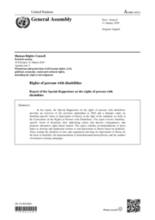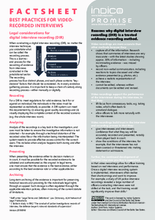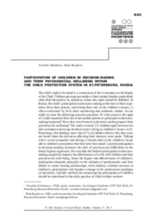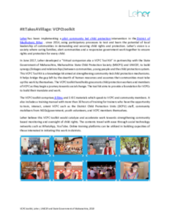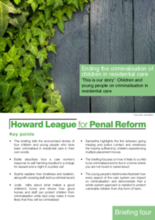Displaying 131 - 140 of 345
In her report, the Special Rapporteur on the rights of persons with disabilities provides an overview of the activities undertaken in 2018 and a thematic study on disability-specific forms of deprivation of liberty, in the light of the standards set forth in the Convention on the Rights of Persons with Disabilities.
There have long been doubts within social work about the viability of reconciling participatory practice with the statutory power that comes hand-in-hand with child protection work. This book explores this issue by proposing an original theory of children’s participation within statutory child protection interventions. It prioritises children’s voices through presentation of a wide collection of children’s experiences of the UK child protection system including three unique in-depth accounts.
This factsheet reviews best practices for conducting a digital interview recording (DIR) with children who have experienced or witnessed violence.
This study raised the following research questions: To what extent is the right of a child separated from his or her natural parents to participate in decisionmaking respected? How does involvement in decision-making impact their psychosocial wellbeing?
This Virtual Companion Tool Kit for child protection committees at the village (VCPCs) is a knowledge kit aimed at strengthening community-led child protection mechanisms.
This phenomenological qualitative study seeks to examine the impact of child rights cultural contestation in supporting OVC in Zimbabwe. The study focuses on the lived experiences, perceptions, feelings and views of OVC and care-givers in the Gutu District of Zimbabwe.
This briefing, part of a series from the Howard Leauge, tells the anonymised stories of four children and young people who have been criminalised in residential care in their own words.
This article discusses a key meeting for children in care – the Child in Care Review – and examines the extent to which children and young people are able to participate and exert a level of control over their lives. The research, conducted in England, formed part of a wider exploration of the views and experiences of all those involved in such reviews, namely Independent Reviewing Officers (IROs), social workers, senior managers and – the focus of this article – the young people concerned.
This paper is based on findings from an Irish study of permanence and stability outcomes for children in long-term care which involved biographical narrative interviews with 27 children, young people, parents and foster carers.
This paper presents community dialogues as a participatory research and program development strategy through which developmental scientists and local community partners can collaboratively surface, discuss, address, and evaluate child protection and well-being issues in their communities.

